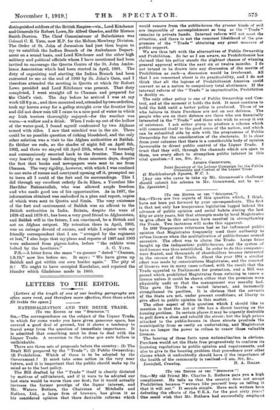[To THE EDITOR OF THE " SPECTATOR:9
SIR,—There are two aspects of this question which, I think, have not been put forward by your correspondents. The first is that not only has temperance legislation lagged behind the advance of public opinion and social habits during the last fifty or sixty years, but that attempts made by local Magistrates to giveeffect to this advance have resulted in strengthening the Trade. Two instances will make this apparent.
In 1869 Temperance reformers had so far influenced public opinion that Magistrates frequently used their authority to refuse licences when the multiplication of public-houses seemed excessive. The effect was to alarm the Trade. Large firma bought up the independent public-houses, and the system of tied-houses was thus established. In order to do this companies were floated, and thousands of shareholders became interested in the success of the Trade. About the year 1904 a similar effort was made by.conscientious Magistrates, and the renewal of licences was in many cases refused, with the result that the Trade appealed to Parliament for protection, and a Bill was passed which prohibited Magistrates from refusing to renew a licence unless it could be shown either that the premises were physically unfit or that the management was morally bad. This gave the Trade a vested interest, and immensely strengthened its position. It is obvious that the servants of the State are not, under present conditions, at liberty to give effect to public opinion in this matter.
The other aspect of this question which I should like to mention is that the Act of 1904 has a direct bearing on the housing problem. In certain places it may be urgently desirable to pull down a slum and rebuild the street; but the high prices attached to the public-houses in those streets preclude the municipality from so costly an undertaking, and Magistrates have no longer the power to refuse to renew these valuable licences.
The bearing of these facts upon nationalization is obvious. Purchase would set the State free progressively to conform its licensing regulations to public opinion and requirements, and also to give to the housing problem that precedence over other claims which it undoubtedly should have if the importance of the health of the community is realized.—I am, Sir, &c.,
Innisfait, Crawicy. H. A. Dma.ss






































 Previous page
Previous page